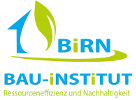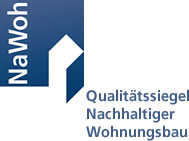The requirements of QNG Certification not only cover climate-friendly construction, but also require sustainable buildings to be comfortable, healthy, functional and in accordance with modern technical standards and at the same time affordable to build and operate. This means that QNG covers both matters of primary importance to building users, which are comfort and functionality, and to society, which are resource utilisation and the reduction of negative environmental impacts.

QNG Certification is aimed at private developers as well as municipal and institutional builders. It can be used as a marketing tool and is suitable for use as a quality assurance instrument.
It is also an effective means for providing financial institutions, insurance companies and valuers with a source of information that clearly reflects a property’s features and characteristics.
QNG Requirement levels
QNG Certification covers two requirement levels, which only differ with respect to their minimum requirements for criteria that are of particular interest to the public. Hence, the different award types (QNG-PLUS and QNG-PREMIUM) awarded on fulfilment of either requirement level act as instant indicators of whether a sustainable building meets above-average quality (QNG-PLUS) or significantly above-average quality (QNG-PREMIUM) requirements.
The different requirements for QNG-PLUS and QNG-PREMIUM Certification are detailed in Annex 3 to the QNG Manual.
QNG Sustainable Building Certification Plus
See here for more information on the Certification mark rules
QNG Sustainable Building Certification Premium
See here for more information on the Certification mark rules
QNG Certification types
The different certification types define specific requirements for specific applications based on the type of building, type of use and type of building measure (e.g. new build non-residential building).
The certification types are successively developed and published. QNG Certification can only be awarded to buildings that fall within the use cases presently covered by the certification and for which registered assessment systems are already available. At present, this includes the following:
Certification types for residential buildings
QNG-WG23 QNG Certification for residential buildings 2023
Certification types for non-residential buildings
NWG-NW23 QNG Certification for non-residential buildings 2023
Information on the withdrawn certification types KN21, WN21, BN22, BK22, UN22 and UK22 can be found in the Archive.
Certification Specifications
The Certification Specifications comprise the QNG-PLUS and QNG-PREMIUM Certification Mark Rules as well as the “Manual for the QNG Sustainable Building Certification” and its appendices and annexes. These documents set out the procedure and requirements for the registration of assessment systems as the basis for providing evidence for the award of the QNG Certification, the special requirements in the public interest for the contribution of buildings to sustainable development, as well as the requirements for certification bodies and the procedure for awarding QNG Certification, all of which are binding. The Certification Specifications can be viewed in full under Download current Certification Specifications.

QNG for residential buildings
In order to qualify for the award of the QNG Certification, a building has to be certified by means of a registered assessment system for sustainable building and fulfil special requirements in the public interest. These assessments are subsequently performed in line with the system rules of the relevant assessment system.
The assessment systems available for residential buildings are:
Although the above registered sustainability assessment systems may differ in terms of their structures, weighting levels, assessment methods, assessment standards and verification procedures, they are all based on a shared understanding of sustainability. In order to be registered, assessment systems have to fulfil the requirements for the registration of assessment systems set out in the QNG Manual and Annex 2 to the QNG Manual. This ensures that QNG Certification assessment systems are fully aligned with internationally recognised sustainability goals, comply with national and international standards and support the implementation of Germany's Sustainable Development Strategy.
Information on the requirements of the registered assessment systems can be found in the assessment systems’ criteria specifications or can be obtained from the system providers and certification bodies.
All of the assessment systems’ general requirements, amongst others, cover:
Certification type QNG-WG23 for residential buildings 2023
Assessment system for small sustainable residential buildings (BNK_V1.0)
| Short name: | NK V1.0 |
| Registered for QNG Certification types: | QNG-WG23, QNG-KN21 |
| System provider: | Bau-Institut für Ressourceneffizienz und Nachhaltiges Bauen GmbH |
| Certification bodies: | Bau-Institut für Ressourceneffizienz und Nachhaltiges Bauen GmbH |
DGNB System New Builds Version 2018
QNG Certification for sustainable buildings (NaWoh V3.1)
| Short name: | NaWoh V3.1 |
| Registered for QNG Certification types: | QNG-WG23, QNG-WN21 |
| System provider: | Verein zur Förderung der Nachhaltigkeit im Wohnungsbau e.V. |
| Certification bodies: | Verein zur Förderung der Nachhaltigkeit im Wohnungsbau e.V. |
Special Requirements
Sustainability certifications cover all of the key aspects of sustainable construction. To be awarded QNG Certification, buildings have to meet a number of additional minimum requirements for criteria that are of particular interest to the public. The minimum QNG Certification requirements for residential buildings pertain to the following criteria:

QNG for non-residential buildings
In order to qualify for the award of the QNG Certification, a building has to be certified by means of a registered assessment system for sustainable building and fulfil special requirements in the public interest. These assessments are subsequently performed in line with the system rules of the relevant assessment system.
The assessment systems available for non-residential buildings are:
Although the above registered sustainability assessment systems may differ in terms of their structures, weighting levels, assessment methods, assessment standards and verification procedures, they are all based on a shared understanding of sustainability. In order to be registered, assessment systems have to fulfil the requirements for the registration of assessment systems set out in the QNG Manual and Annex 2 to the QNG Manual. This ensures that QNG Certification assessment systems are fully aligned with internationally recognised sustainability goals, comply with national and international standards and support the implementation of Germany's Sustainable Development Strategy.
Information on the requirements of the registered assessment systems can be found in the assessment systems’ criteria specifications or can be obtained from the system providers and certification bodies.
All of the assessment systems’ general requirements, amongst others, cover:
Certification type QNG-NW23 for non-residential buildings
DGNB System New Builds Version 2018
Assessment System for Sustainable Building, Version 2015
| Short name: | BNB V2015 |
| Registered for QNG Certification types: | QNG-NW23, QNG-NWG-BN22 |
| System provider: | Federal Ministry for Housing, Urban Development and Building (BMWSB) |
| Certification bodies: | Steinbeis-Transfer-Institut Bau- und Immobilienwirtschaft |
Assessment System for Sustainable Building, Version 2017
| Short name: | BNB V2017 |
| Registered for QNG Certification types: | QNG-NW23, QNG-NWG-BK22, QNG-NWG-UN22, QNG-NWG-UK22 |
| System provider: | Federal Ministry for Housing, Urban Development and Building (BMWSB) |
| Certification bodies: | Steinbeis-Transfer-Institut Bau- und Immobilienwirtschaft |
Special Requirements
Sustainability certifications cover all of the key aspects of sustainable construction. To be awarded QNG Certification, buildings have to meet a number of additional minimum requirements for criteria that are of particular interest to the public. The minimum QNG Certification requirements for non-residential buildings pertain to the following criteria:
Accreditation and Registration
Accredited certification bodies
The Federal Ministry of Building does not itself, as the owner of the Certification scheme, perform any monitoring or assessment functions.
Instead, QNG Certification applications are assessed and QNG Certification is awarded by accredited certification bodies that are monitored by the German Accreditation Body (DAkkS). These certification bodies check whether the requirements for the award of QNG Certification have been met at the technical and operational levels. The certification bodies are also the points of contact for developers/builders.
Registered assessment systems
QNG Certification not only builds on existing sustainability assessment systems for sustainable construction on the market, but also includes them. A prerequisite for their inclusion is that they fulfil the quality assurance requirements of and are registered or approved for QNG Certification.
For a list of the registered assessment systems and accredited certification bodies for QNG Certification, please see here.





